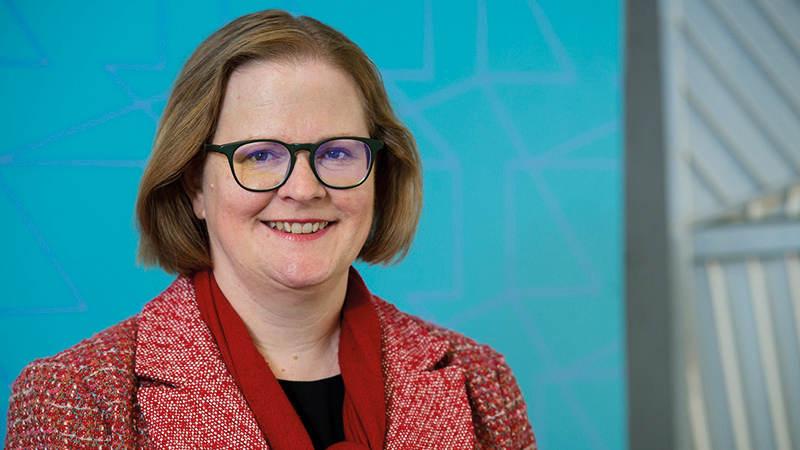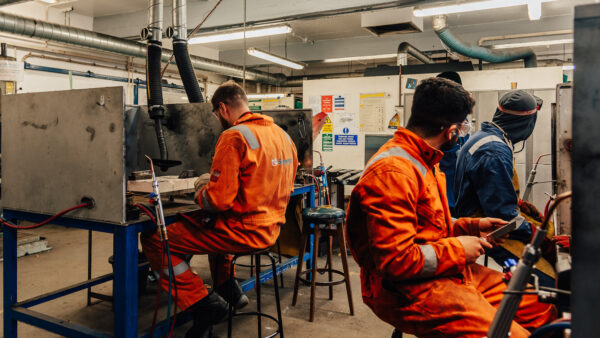
Jacqui Glass FCIOB, interim dean of The Bartlett Faculty of the Built Environment at UCL, says entrenched industry attitudes need to be challenged.
What are you working on at present?
Most recently the focus is on what can be broadly described as ‘construction project organising’. It is a fascinating and wide-ranging topic which is covered brilliantly in the recent book of the same name, edited by my colleagues at UCL’s Bartlett School of Sustainable Construction, Dr Simon Addyman and Professor Hedley Smyth.
Just to give you an example, I am interested in the opportunities that industrialised construction can offer, whereby we arrange how we design, produce and build in such a way that we can make best use of automation – and that has digital, organisational and technical implications.
If we are to take advantage of this, then we do have to accept that we will need to organise our people, our contracts and our production and delivery approaches quite differently. This is an exciting prospect for future interdisciplinary research and collaborative projects.
Why is it important to the construction industry now?
How we choose to organise ourselves, our firms, our supply chains – all of these are obviously things that can be studied in any industry, but what makes this pertinent to construction is that every project is different, so the danger is that we organise differently every time, and that is not great for productivity – or indeed profitability.
For instance, if we are to overcome the fragmentation that occurs between the various actors, functions and phases on every customised, temporary moment of organising (ie ‘project’), then we have to question anyone who says ‘but that’s how we’ve always done it’ – otherwise we’ll never achieve the industry transformation we need.
CV: Jacqui Glass FCIOB
2019-present Vice dean research, The Bartlett, UCL
2018-present Professor of construction management, UCL
2003-18 Professor in architecture and sustainable construction, Loughborough University
1998-2003 Consultant, British Cement Association
Education Oxford Brookes University, BA Architecture
And it is that transformation which will enable the construction industry to extend its capabilities to tackle wider societal and global concerns like climate change.
What is new about this research, compared to past work on this topic?
Of course, we are still talking about the possibilities of greater prefabrication – that conversation has been going on for years and I don’t expect it to stop any time soon, but it won’t move on any further unless we delve more deeply into the real implications of moving to more industrialised construction.
We have been working on a project with a major consulting organisation to better understand what’s behind the failure of so many offsite providers. By examining the issues in a systematic way, we are identifying the programmatic and procedural barriers more clearly, and, although it will be a very difficult job to overcome them, I think we are starting to see the light!
Are you working with any construction companies so they can apply your research?
We work with construction firms all the time – I can’t imagine doing research without them! It works best when we co-create research activity with them from the outset, which is what we’re trying to do in the Centre for Construction Project Organising (CCPO) at The Bartlett.
What areas do you think are most crucial for academics to focus on now to meet industry challenges?
It is fair to say that the climate crisis is at the forefront of my mind when I think about the global, existential challenges we are all facing. I am keen to start thinking about how we build in a climate-compromised future. It’s not just about flooded sites and lifts being winded off – there’s more to it than that, and I’d like to see academics looking further into the future.

“Every project is different, so the danger is that we organise differently every time, and that is not great for productivity – or indeed profitability.”
What advice would you give to a built environment professional who wants to explore the opportunities in education alongside their work?
Drop us a line! Seriously, everyone I know who is an academic in the field is keen to hear from industry. Even if it’s just to offer a guest lecture to the students, we’ll always be grateful.
But I would also say: think of the junior lecturers who are just starting out. I am in the privileged position of having over 20 years of collaborative research experience so, like many professors, I love to see industry supporting our budding academics who can benefit from site visits, suggestions for research topics and student dissertations too.
It’s great to see strong relationships being built – and in this way, academics and firms can develop enduring and exciting joint projects.
How wide is the gap between academic research and industrial application? How can we address it?
Let’s face it – we are always likely to have a bit of a challenge here. It’s helpful for industry to understand that ‘peer review’ of academic work by other academics is vital for someone’s track record. So, as much as we enjoy collaborating on practical problems and industry ideas, sometimes we do have to focus on the details of the theory, the method and the philosophy of what we are doing – because that is how we judge the rigour of one another’s work.
That said, I am a firm believer that any research can be translated and communicated in a way that anyone can understand it. When I was leading the Transforming Construction Network Plus at The Bartlett, we produced a series of industry digests and short animations to do just that – and I am delighted that they have been downloaded and viewed thousands of times to date.
If you’re interested in academic membership visit ciob.org/membership/become-a-member/educator.








